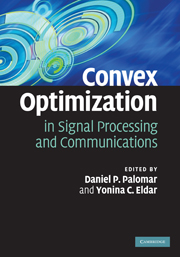Book contents
- Frontmatter
- Contents
- List of contributors
- Preface
- 1 Automatic code generation for real-time convex optimization
- 2 Gradient-based algorithms with applications to signal-recovery problems
- 3 Graphical models of autoregressive processes
- 4 SDP relaxation of homogeneous quadratic optimization: approximation bounds and applications
- 5 Probabilistic analysis of semidefinite relaxation detectors for multiple-input, multiple-output systems
- 6 Semidefinite programming, matrix decomposition, and radar code design
- 7 Convex analysis for non-negative blind source separation with application in imaging
- 8 Optimization techniques in modern sampling theory
- 9 Robust broadband adaptive beamforming using convex optimization
- 10 Cooperative distributed multi-agent optimization
- 11 Competitive optimization of cognitive radio MIMO systems via game theory
- 12 Nash equilibria: the variational approach
- Afterword
- Index
1 - Automatic code generation for real-time convex optimization
Published online by Cambridge University Press: 23 February 2011
- Frontmatter
- Contents
- List of contributors
- Preface
- 1 Automatic code generation for real-time convex optimization
- 2 Gradient-based algorithms with applications to signal-recovery problems
- 3 Graphical models of autoregressive processes
- 4 SDP relaxation of homogeneous quadratic optimization: approximation bounds and applications
- 5 Probabilistic analysis of semidefinite relaxation detectors for multiple-input, multiple-output systems
- 6 Semidefinite programming, matrix decomposition, and radar code design
- 7 Convex analysis for non-negative blind source separation with application in imaging
- 8 Optimization techniques in modern sampling theory
- 9 Robust broadband adaptive beamforming using convex optimization
- 10 Cooperative distributed multi-agent optimization
- 11 Competitive optimization of cognitive radio MIMO systems via game theory
- 12 Nash equilibria: the variational approach
- Afterword
- Index
Summary
This chapter concerns the use of convex optimization in real-time embedded systems, in areas such as signal processing, automatic control, real-time estimation, real-time resource allocation and decision making, and fast automated trading. By “embedded” we mean that the optimization algorithm is part of a larger, fully automated system, that executes automatically with newly arriving data or changing conditions, and without any human intervention or action. By “real-time” we mean that the optimization algorithm executes much faster than a typical or generic method with a human in the loop, in times measured in milliseconds or microseconds for small and medium size problems, and (a few) seconds for larger problems. In real-time embedded convex optimization the same optimization problem is solved many times, with different data, often with a hard real-time deadline. In this chapter we propose an automatic code generation system for real-time embedded convex optimization. Such a system scans a description of the problem family, and performs much of the analysis and optimization of the algorithm, such as choosing variable orderings used with sparse factorizations and determining storage structures, at code generation time. Compiling the generated source code yields an extremely efficient custom solver for the problem family. We describe a preliminary implementation, built on the Python-based modeling framework CVXMOD, and give some timing results for several examples.
Introduction
Advisory optimization
Mathematical optimization is traditionally thought of as an aid to human decision making.
- Type
- Chapter
- Information
- Publisher: Cambridge University PressPrint publication year: 2009
- 24
- Cited by

